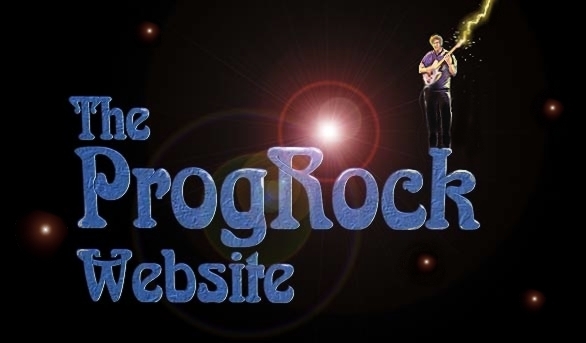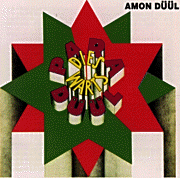1967 brought the creation of Amon Düül, whivh emerged from a Munich political art commune of Bohemian intellectuals. They named the band from the synthesis of the Egyptian Sun God- Amon; while- Düül is the Turkish word for Moon. The free-thinking environment gave easy access to free form musical improvisations. A faction of the commune that became more serious musicians in 1969 formed the hardcore group in Amon Düül I and Amon Düül II. After the commune split into two groups in 1968, Amon Düül 1 was reduced to about 6 members. Members: Peter Leopold, Ullrich Leopold, Rainer Bauer, Ella Bauer, Helge Filanda, Uschi Obermaier, and Angelica Filanda.
In the 1970, Amon Düül I celebrated a successful psychedelic rock status, though the music was interrupted by frequent personal changes including a prominent glamour girl, Uschi Obermaier. Their first release- `Psychedelic Underground,' (Metronome, 1969), showcased improvisations and a multitude of studio effects. The band played for seven years in many different forms, all with varying levels of success. Their third album- `Disaster' was indeed that, and shortly after that, the group broke up in 1973 after releasing four official albums.
 Amon Düül II, was created by founding members Peter and Ulrich Leopold, Falk Rogner, Chris Karrer, John Weinzierl and Renate Knaup. They placed greater emphasis on musical ability and in 1969, released their debut album- `Phallus Dei' (God's Penis). The title track clocked in at 21 minutes. They won a German film award for their contribution to the film- San Domingo. Their music was cold and mechanical, but also contained lengthy, complex conceptual albums all revolving around themes of death, doom, and mystery.
Amon Düül II, was created by founding members Peter and Ulrich Leopold, Falk Rogner, Chris Karrer, John Weinzierl and Renate Knaup. They placed greater emphasis on musical ability and in 1969, released their debut album- `Phallus Dei' (God's Penis). The title track clocked in at 21 minutes. They won a German film award for their contribution to the film- San Domingo. Their music was cold and mechanical, but also contained lengthy, complex conceptual albums all revolving around themes of death, doom, and mystery.
 `Yeti', the band's second release, found a following in England. Regarded as their defining album, the music epitomizes mind-blowing psychedelic power, with a definite spacey sound. The band found a nice niche in the psychedelic movement and secured fans of bands such as Pink Floyd, Jefferson Airplane, and Velvet Underground. Atlantic records signed them in 1975. Pushed by the label, Amon Düül II moved into a more commercial avenue with bigger production values. In 1978, with the release of a final album, Amon Düül II called it quits.
`Yeti', the band's second release, found a following in England. Regarded as their defining album, the music epitomizes mind-blowing psychedelic power, with a definite spacey sound. The band found a nice niche in the psychedelic movement and secured fans of bands such as Pink Floyd, Jefferson Airplane, and Velvet Underground. Atlantic records signed them in 1975. Pushed by the label, Amon Düül II moved into a more commercial avenue with bigger production values. In 1978, with the release of a final album, Amon Düül II called it quits.
 In the 1980's both group Amon Düül I & Amon Düül II reformed. After numerous failed attempts at a more commercial market with albums like `Made in Germany' and `Pyragony X,' along with consistent line-up juggling, the group eventually disbanded in the early 80s. Around this same time, John Weinzierl went on to form a third incarnation of the group, Amon Düül UK. All in all, between 1982 and 1989, Amon Düül II released five albums, but neither returned to the band;S earlier critical and commercial success.
In the 1980's both group Amon Düül I & Amon Düül II reformed. After numerous failed attempts at a more commercial market with albums like `Made in Germany' and `Pyragony X,' along with consistent line-up juggling, the group eventually disbanded in the early 80s. Around this same time, John Weinzierl went on to form a third incarnation of the group, Amon Düül UK. All in all, between 1982 and 1989, Amon Düül II released five albums, but neither returned to the band;S earlier critical and commercial success.
 Krautrock became popular in the late 1990's. With the help of Can, Faust, and Kraftwerk, helped both reincarnations of Amon Düül return to the music world.
Krautrock became popular in the late 1990's. With the help of Can, Faust, and Kraftwerk, helped both reincarnations of Amon Düül return to the music world.
 On November 8th, 2006, Amon Düül II's drummer Peter Leopold passed away. At the Munich memorial service the remaining members of Amon Düül II sang a song for him.
On November 8th, 2006, Amon Düül II's drummer Peter Leopold passed away. At the Munich memorial service the remaining members of Amon Düül II sang a song for him.
 Because both bands had little or no stability in their lineups, it has been said that it caused both bands reaching the heights of the rock music industry. Yet, after 35 years of on and off in music, the groups are still playing. The current line-up for Amon Düül II is: Jan Kahlert, Chris Karrer, Renate Knaup- Krôtenschwanz, Lothar Meid, and John Weinzierl, with Danny Fichelcher possibly as a replacement for Peter Leopold.
Because both bands had little or no stability in their lineups, it has been said that it caused both bands reaching the heights of the rock music industry. Yet, after 35 years of on and off in music, the groups are still playing. The current line-up for Amon Düül II is: Jan Kahlert, Chris Karrer, Renate Knaup- Krôtenschwanz, Lothar Meid, and John Weinzierl, with Danny Fichelcher possibly as a replacement for Peter Leopold.

 The German labels SPV/Revisited Records released Amon Düüll II's Yeti and Tanz der Lemminge on May 19, 2006 with bonus tracks.
The German labels SPV/Revisited Records released Amon Düüll II's Yeti and Tanz der Lemminge on May 19, 2006 with bonus tracks.
Bass player Lothar Meid died on 3 November 2015
Band members
Chris Karrer – violin, guitars, saxophone, vocals (1969-1981)
John Weinzierl – guitar, bass, vocals (1969-1977)
Falk Rogner – organ, synthesizer, electronics (1969-1971, 1972-1975, 1981)
Renate Knaup – vocals, tambourine (1969-1970, 1972-1975, 1981)
Dieter Serfas – drums (1969)
Peter Leopold – drums, percussion (1969-1972, 1973-1979, died 2006)
Christian "Schrat" Thierfeld – bongos, vocals, violin (1969-1970)
Dave Anderson – bass (1969-1970)
Lothar Meid – bass, vocals (1971-1973, 1974, died 2015)
Karl-Heinz Hausmann – keyboards, organ, electronics (1971-1972)
Danny Fichelscher – drums, percussion, guitar (1972, 1981)
Robby Heibl – bass, guitar, violin, vocals (1973, 1975)
Nando Tischer – guitar, vocals (1975)
Klaus Ebert – guitar, bass, vocals (1976-1979)
Stefan Zauner – keyboards, synthesizer, vocals (1976-1979)
Jörg Evers – bass, guitar, synthesizer (1981)
Discography
Amon Düül I
Psychedelic Underground (1969)
Collapsing/Singvögel Rückwärts & Co. (1970)
Paradieswärts Düül (1970)
Disaster (Double LP) (1972)
Experimente (1983)
Amon Düül II
Phallus Dei (1969)
Yeti (1970)
Tanz der Lemminge (aka Dance of the Lemmings) (1971)
Carnival In Babylon (1972)
Wolf City (1972)
Live In London (live) (1973)
Utopia (originally released under the band name Utopia) (1973)
Vive La Trance (1974)
Hijack (1974)
Lemmingmania (Compilation) (1975)
Made In Germany (Double LP) (1975)
Pyragony X (1976)
Almost Alive... (1977)
Only Human (1978)
Rock in Deutschland Vol.1 (Compilation) (1978)
Vortex (1981)
Hawk Meets Penguin (1981)
Meeting With Men Machines (1984)
Fool Moon (1989)
Die Lösung (with Robert Calvert) (1989)
Milestones (Compilation) (1989)
Live In Concert (BBC recording from 1973) (1992)
Surrounded By The Bars (1993)
The Greatest Hits (Compilation) (1994)
Nada Moonshine (1995)
Kobe (Reconstructions) (1996)
Eternal Flashback (1996)
Live In Tokyo (live) (1996)
The Best Of 1969-1974 (Compilation) (1997)
Flawless (1997)
Drei Jahrzehnte (1968-1998) (Compilation) (1997)
The UA Years: 1969–1974 (1999)
Manana  (2000 Compilation)
(2000 Compilation)
Once Upon a Time – Best of 1969–1999 ( 2001 Compilation) 
Anthology  A complete Amon Düül II career retrospective ( 2005) Compilation)
A complete Amon Düül II career retrospective ( 2005) Compilation)
Düülirium (2010)  Originally released online as Bee as Such First released on CD and vinyl in 2014
Originally released online as Bee as Such First released on CD and vinyl in 2014


